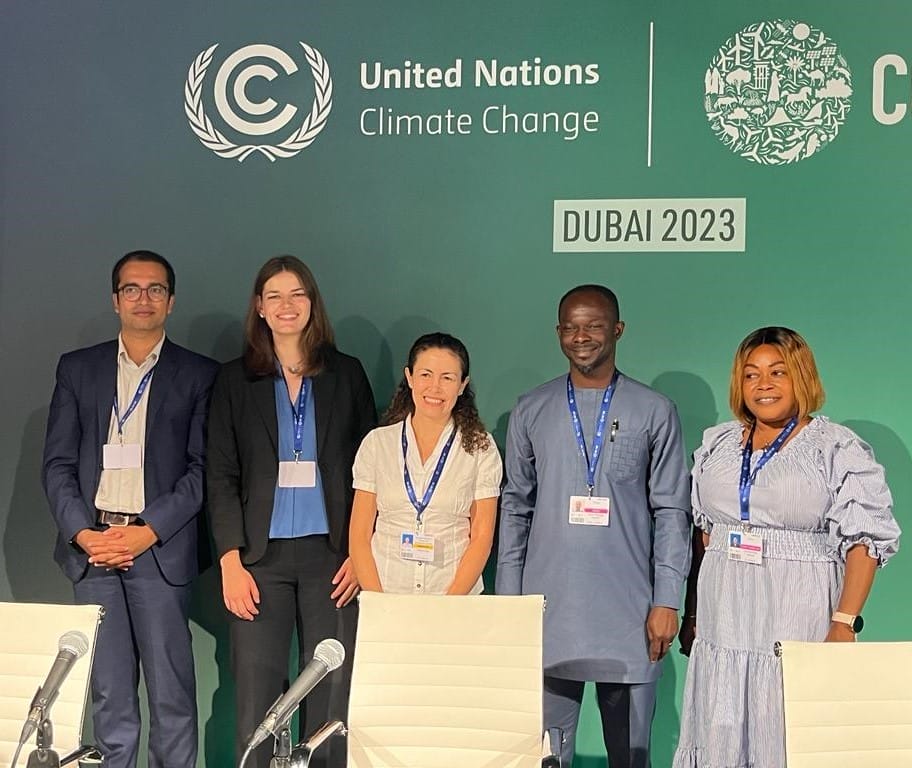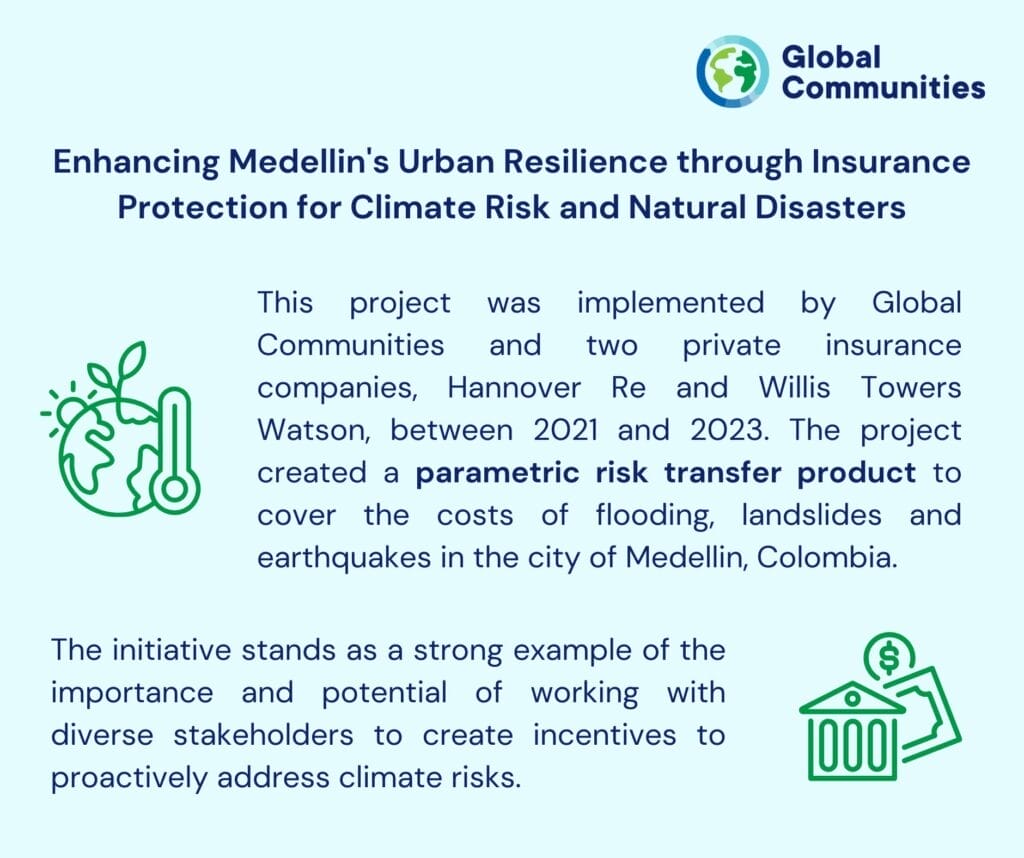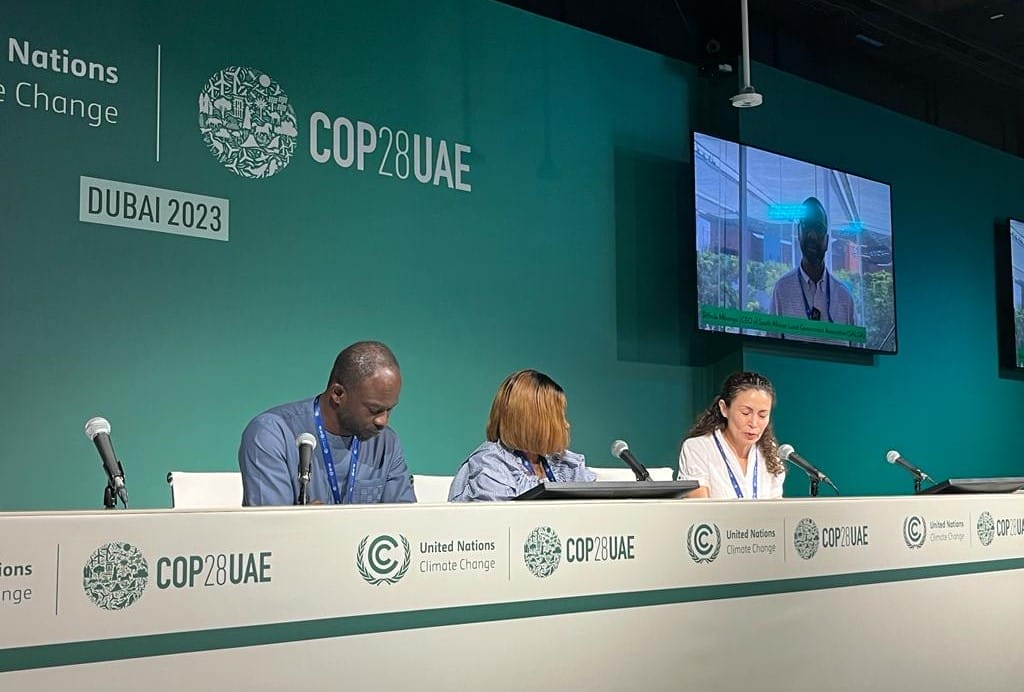News > Blog
How to Develop Climate & Disaster Risk Finance Strategies: Reflections from the COP28
Published 02/26/2024 by Global Communities

By Patricia Inga Falcón & Noah Steinberg-Di Stefano
At the end of last year, more than 80,000 world leaders and climate justice advocates gathered in Dubai, United Arab Emirates, for the 28th Conference of the Parties to the United Nations Framework Convention on Climate Change (COP28).
Since the first COP in Berlin in 1995, these forums have provided an opportunity for a wide range of stakeholders to come together and discuss global initiatives to reduce greenhouse gas emissions and confront the rapidly evolving climate change challenges. Global Communities was present at the COP28, participating in learning exchanges and sharing insights on how to create compelling incentives for government and community leaders to tackle climate change at the local level.
On Dec. 11, 2023, Patricia Inga Falcón – our Senior Technical Advisor for Resilience – presented the results of Global Communities’ project “Enhancing Medellin’s Urban Resilience through Insurance Protection for Climate Risk and Natural Disasters“ in a parallel session organized by the Munich Climate Insurance Initiative and the Frankfurt School of Management. The session, “Development-Positive Climate and Disaster Risk Finance Strategies: Outlook and Experiences,“ focused on the interconnection between debt and climate crisis and provided examples of financial protection initiatives to overcome it.
At the beginning of the session, the panelists explained how the poly-crisis, understood as the multiple shocks that have affected countries and increased their vulnerability in recent years, has been worsening because of the effects of climate change. They also emphasized that addressing the climate crisis is impossible without tackling rising debt. An estimated 3.3 billion people live in countries where external debt payments are greater than expenditures on investments, education or health services. Therefore, it is essential to look for financial mechanisms for dealing with climate risks that do not increase indebtedness.
In this context, the panelists explained how pre-arranged financing helps cover natural disaster costs, mitigate risks in a timely manner and reduce the negative coping strategies. They also described financial vehicles which are available to support vulnerable countries in developing and implementing pre-arranged climate and disaster risk finance and insurance solutions. They include the Global Solution Platform and the tripartite agreement program – an initiative between the Insurance Development Forum (IDF), the United Nations Development Program and the German Ministry for Economic Cooperation and Development, which supports innovative risk transfer interventions, such as Global Communities’ project in Medellin, Colombia.

During the session, Patricia presented the successes and challenges of the project, which was financed through the InsuResilience Solutions Fund (ISF) set up by the German Development Bank and implemented in alliance with the Municipality of Medellin. She recalled that the project was based on studies which had uncovered why risk transfer solutions were not commonly used in the public sector as financial mechanisms to cope with climate risks. The public sector officials’ most common answers to that question were their lack of knowledge of how risk transfer solutions function and their distrust in the effectiveness of such mechanisms. In addition, the solutions were not adapted to their needs.
The studies also showed that cities often deal with urgent natural disaster costs by using transfers from budget lines dedicated to other development goals or by increasing public debt. For this reason, it was important to coordinate closely with risk insurance experts and adapt the technical approach to the local context by developing a unique risk profile and building incentives to adopt the solution. The goal was for Medellin to be better prepared and more resilient in the face of climate-related shocks.

Patricia highlighted that the project was implemented with a participatory approach aimed at transferring knowledge and strengthening the city’s capacity to understand and manage risk transfer solutions. The end product was a tailored risk transfer solution adapted to Medellin’s needs and budget. Patricia noted that one of the challenges was the dispersion of the local climate data among government entities and the lack of systematized information on the costs of previous natural disasters. She emphasized that local and national governments need to keep track of these costs because it is a crucial element in the cost-benefit analysis of any risk transfer solution.
Patricia also highlighted the usefulness of having a wide range of stakeholders that contribute to the project’s success and sustainability. Moreover, it is crucial to build a common technical language among the stakeholders that allows them to understand the complexity of the risk transfer solutions and the need to be flexible and keep pace with the public sector timelines and processes.
At the end of the session, the panelists expressed a wish that pre-arranged finance solutions gain more funding and traction in dealing with the interconnected climate and debt crises. Global Communities continues to explore opportunities with ISF and the Municipality of Medellin to move this work forward and promote it as a model approach to climate risk mitigation in other cities in the region.
We look forward to engaging at future COPs. These are unique global forums for climate activists, government representatives and private sector partners from every corner of the globe to exchange innovative ideas and collaborate to address some of the world’s most pressing challenges caused by climate change.




